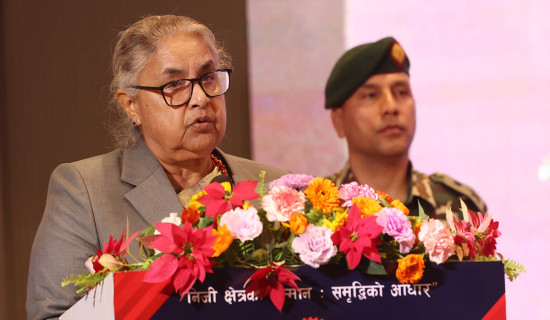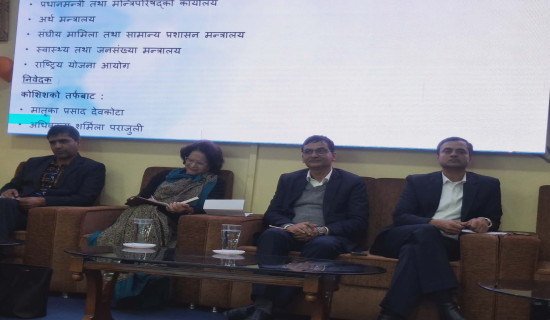- Wednesday, 31 December 2025
Boost Investment In Climate Actions
Man has made great advances in virtually every field, making life better than ever. At the same time, such advances have also engendered undesirable outcomes around the world. Climate change is one such consequence the world is facing right now. Since the 1800s, anthropogenic activities have led to climate change owing to the burning of fossil fuels such as coal, oil and gas and release of carbon dioxide into the atmosphere. When fossil fuels are burned, greenhouse gases are released, trapping the sun’s heat and heating up the earth. Further, carbon dioxide is also released when land is cleared for various purposes or trees are felled. Methane is released by agricultural, oil and gas operations. Energy production, industry, transport, construction works, land use and other suchlike human activities are responsible for the generation of greenhouse gases.
As per various global agreements on containing climate change such as the Paris Agreement, it has been agreed to confine an increase in the temperatures to within 1.5 degrees Celsius vis-à-vis the pre-industrial base. However, the average temperatures have increased by 1.2 degrees Celsius more than during the pre-industrial period. Although the benchmark of limiting a rise in global temperatures to 1.5 degrees Celsius is desirable as shown by various UN reports, there are apprehensions that the temperatures could rise by up to 3.1 degrees Celsius by the turn of this century.
Warmest decade
The last decade (2011-2020) is recorded as the warmest decade in the history of the earth. The earth maintained its temperatures at a favourable level for centuries but human interventions since the Industrial Revolution have disrupted the temperature cycle. The consequences of climate change are dire. Owing to such consequences, global temperatures have rising on the one hand, while on the other extreme weather patterns have developed. Droughts, excessive precipitation, flooding, soil erosion, water scarcity, fires, rising sea levels, melting of ice in the polar regions, storms and the like have taken place on an unprecedented scale. The recent violent storms – hurricanes and typhoons – in the US and elsewhere are the upshot of climate change. When oceans are heated up, more violent storms emerge. Likewise, melting of polar ice leads to a rise in sea levels, which may intensify flooding. Climate change has also resulted in ecosystem disruptions. Further, climate change can affect the human health, agricultural activities, settlements and even biodiversity.
Climate change has alerted countries around the world to its consequences. As such, they have formulated global mechanisms for fighting climate change. The Sustainable Development Goals, the UNFCCC (United Nations Framework Convention on Climate Change) and the Paris Agreement are in place. These mechanisms aim at reducing carbon emissions, adapting to climate change impacts and scaling up adaptation finance.
In 2023, six biggest emitters of carbon – the US, China, India, the European Union, Russia and Brazil - were found responsible for emitting more than half of all greenhouse gas emissions. In contrast, 47 least developed countries like Nepal contributed less than three per cent to greenhouse gas emissions. The contribution of Nepal to greenhouse gas emissions is negligible but the country is suffering from the impacts of climate change such as heavy precipitation and floods.
It is high time sustainable solutions to climate change were sought. The best solution would be to remove carbon from the atmosphere. It may be noted that natural processes like photosynthesis and ocean uptake naturally sequestrate carbon but it is not enough. So technology for accelerating the sequestration of carbon needs to be developed. The carbon already present in the atmosphere is more than enough to aggravate the carbon cycle.
There are various ways to reduce carbon emissions by adopting carbon mitigation strategies. Transitioning from fossil fuels to renewable energy such as hydropower, wind energy and solar energy will reduce the release of carbon into the atmosphere. Other methods include enhancing energy efficiency and implementing policies on the reduction of carbon emissions from industry, transport, agriculture, construction and other sectors.
It is obvious that climate change has disproportionate impacts on developing and least developed countries. In this regard, developed countries need to help vulnerable countries to cope with climate change. Global financial institutions and the private sector should increase climate finance and investment in green technology. Moreover, big corporate houses may be mobilised to support climate action. Investment decisions pertaining to climate action need to be transparent and result-oriented.
National plans
It would be pertinent to mention the 2024 UN Climate Change Conference, better known as COP 29, which will take place in Baku, Azerbaijan, from November 11 – 22. As in other conferences on climate change, the forthcoming conference will hold deliberations, inter alia, on confining global temperatures to within 1.5 degrees Celsius. To fight climate change, investment in climate action needs to be made on an urgent basis. The countries around the world need to formulate national plans to fight climate change. Financing needs to be in place to reduce carbon emissions and address climate impacts. The loss and damage fund needs to be brought into operation to support vulnerable communities. The fund will benefit small island developing countries and least developed countries.
Moreover, nationally determined contributions (NDCs) also need to be enhanced. As per the provision, NDCs, which will have to be submitted to the United Nations by 2025, include phasing out fossil fuels, promoting renewable energy and addressing carbon emissions. The use of electric vehicles instead of petrol- or diesel-based vehicles is a step towards reducing carbon emissions. It follows that failure to tackle climate change will jeopardise vulnerable communities. As a result, they will be displaced and have to be relocated to safe places. So the world community should act now and save the world from being an inhospitable place to live in.
(Maharjan has been regularly writing on contemporary issues for this daily since 2000.)













-original-thumb.jpg)


